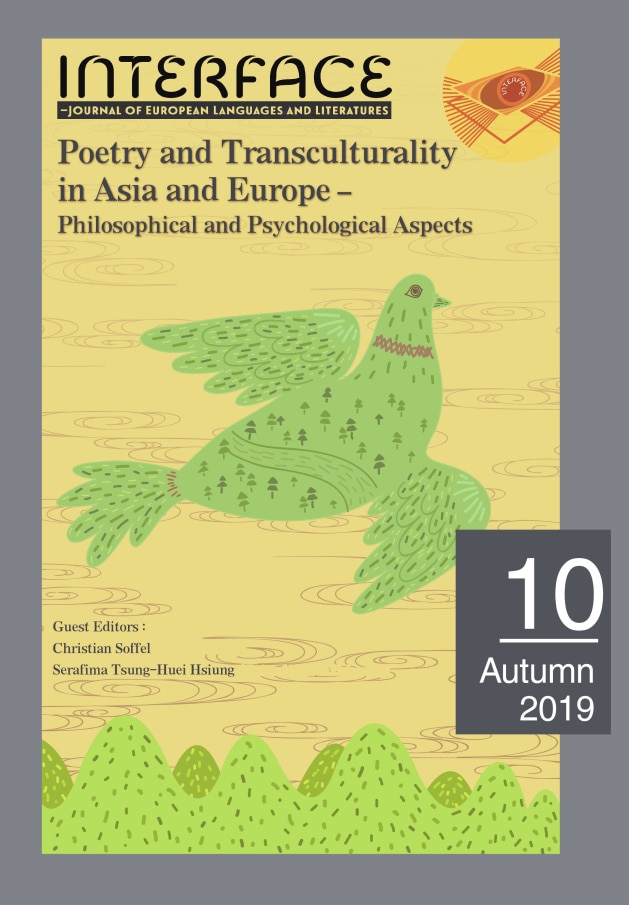
FOR 2603 2017 – 2023

The DFG-Centre of Advanced Study Poetry in Transition (FOR 2603) has published a new volume at the conference “Poetry and Transculturality in Asia and Europe” entitled within the magazine Interface – Journal for European Languages Poetry and Transculturality in Asia and Europe – Philosophical and Psychological Aspectsand Literature ( http://interface.ntu.edu.tw/ )
Poetry and Transculturality in Asia and Europe – Philosophical and Psychological Aspects
Interface – Journal for European Languages and Literature
Issue 10 (Autumn 2019)
Abstract:
Inter- and transcultural topics are abundant in various literatures (including but not limited to Russian, Chinese, Japanese, English and German), often developing surprisingly similar characteristics even in geographically distant locations, different genres or time periods. One particular factor fostering such developments is the transformation process of a particular literary motive from one culture to another, often by the use of translation. It becomes especially apparent when depicting borderline experience, or in a multilingual context. In our temporary globalized world, such issues are not just interesting from a historian’s perspective, but are relevant for reevaluating cultural contacts all over the globe. A great many of these phenomena are philosophical or psychological in nature, whether they are transcendental experiences, or mnemonic characteristics of writing, or self-reflections.
The foundation to interface, Issue 10: “Poetry and Transculturality in Asia and Europe –Philosophical and Psychological Aspects” was laid during the International Symposium “Poetry and Transculturality in Asia and Europe”, held in Taipei at Taiwan University in February 2019, organized jointly with the Center for Advanced Studies “Russian Poetry in Transition” (FOR 2603) at Trier University. Our present volume addresses these issues from several perspectives.
The issue begins with an article on temporal structures in the work of Thomas Gray, an English poet and scholar from the 18th century. The author demonstrates convincingly the intermingling of cyclical and linear time conceptions in his odes and sonnets. This lyrical configuration is connected to changes in daytime and landscape as well as the image of the author placed in the corresponding context, thus creating a transfigural piece of literature, which even extends beyond the boundaries of a single human life span.
The next paper of this issue explores the “transpoetical” œuvre by Jean-Pierre Balpe, a French scholar, who publishes poems on the internet under various pseudonyms. His engagement in literature reaches from experimental computer-generated verses to Japanese style haiku poems, thus opening up a space, in which a transgression of borders in various aspects (cultures, genres, lyrical subjectivity, cultural identity) is taking place.
Baba Yaga is the central topic of the following contribution. The famous witch from East Slavic fairy tale mythology is depicted in two “novels in poems” by the US American authors Jane Yolen and Lana Hechtman. These works depict Baba Yaga from a feminist perspective as a strong female protagonist. Parallel to the transparent connectivity of verse and prose genres, the authors develop an archetypal notion of femininity / masculinity representing the dichotomy of soul and intellect.
The theoretical background of the present volume gets interconnected by the final article contemplating on two concepts of cultural genesis that were developed by Vasily Rozanov and Sigmund Freud at the turning point of the 19th and 20th centuries. They differ on their viewpoint on physical procreation as cultural value. Additionally, the author introduces a thoughtful distinction between “transition” and “translation” in the context of cultural processuality. This theoretical foundation is then applied to a collection of lyrical pieces by the contemporary Russian poet Vera Pavlova.
These articles show nicely the common ground and the intrinsic resonances between lyrical expressions from different cultures, languages, genres and time periods, be it in terms of the poetic depiction of transcendental experiences, in the field of cultural translation, the connection between memory and writing or of the author as creative self.